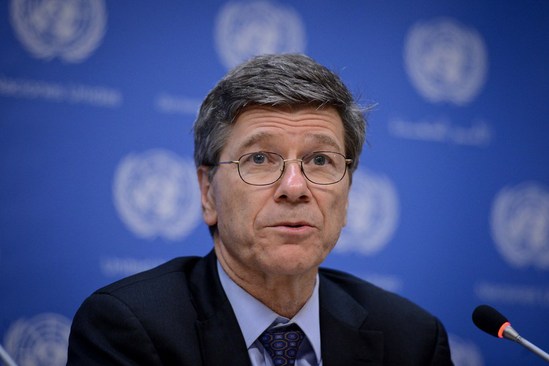作者:Jeffrey Sachs 发布时间:2021-11-12 来源:China Daily+收藏本文

Jeffrey Sachs [File Photo/Xinhua]
A leading US scholar called upon the United States to stop unilateral trade sanctions and abandon Cold War mentality in exchange for wider international cooperation to fight the COVID-19 pandemic and climate change during a forum that opened in Shanghai on Friday.
Jeffrey Sachs, director of the Center for Sustainable Development at Columbia University and a former adviser to three United Nations secretary-generals, delivered a speech via video to more than 2,000 other scholars and business and media representatives from around 40 countries attending Shanghai Forum 2021 both online and offline.
This is no time for divisions between the major powers. This is the time for global cooperation, said Sachs, adding that the G20 meeting in Rome and the COP 26 summit in Glasgow, both of which started over the weekend, are crucial events that will help curb the COVID-19 pandemic, set a clear global climate strategy and initiate a green recovery.
COVID-19 cannot be ended one country at a time. It requires global cooperation, he said, stressing that universal access to vaccines is key, and more developed countries need to work together on a plan to produce and distribute them.
We need to stop the unilateral trade and financial sanctions, mainly coming from the United States. This is disrupting global trade, creating unnecessary uncertainties in business, production, supply chains, foreign investment and it is against WTO principles, said Sachs, who once taught international trade at Harvard University.
I really urge my own country, the United States, to drop the unilateral trade and financial sanctions regimes. This is only harming the international system, making it much harder for us to have a recovery from the pandemic, he said.
As an annual event held by Fudan University and the Chey Institute for Advanced Studies, this year's theme was Recovery and Resilience: Asia's Role in a Sustainable Future.
Sachs stressed the importance of international technology cooperation for achieving carbon neutrality.
Whether it is the development of the hydrogen economy, artificial intelligence or advanced transport in the move to zero carbon (emissions), we should not have a 'Cold War' in these technologies … The US should not be imposing unilateral barriers on the flow of technology, which hurts everybody, he said.
As an expert of sustainable development, Sachs also underlined the need for more financing for developing countries. Major economies, especially the US, have borrowed trillions of dollars from capital markets for post-COVID recovery, he said, and developing countries also need such funding.
They need more official financing, especially through the multilateral development banks. In Asia, they include the New Development Bank, Asian Infrastructure Investment Bank and others, he said. These institutions are extremely important, but they actually operate at quite a small scale compared to the financing needs (of developing countries).
We should be looking at the G20 for massive new capitalization for multilateral development banks to enable them to expand their lending capacity, maybe five to 10 times more, suggested Sachs.
That way, developing countries will be able to invest in zero carbon energy systems, in digital technology and in the other steps that they need to achieve the UN Sustainable Development Goals and the Paris Climate Agreement, he said.
Kishore Mahbubani, the former ambassador of Singapore to the UN, Svein Stolen, rector of the University of Oslo, and Xu Bu, president of the China Institute of International Studies, also made keynote speeches at the opening ceremony of the forum.
During the two-day event, 14 roundtables on topics such as data governance, green finance and regional economic integration were held.